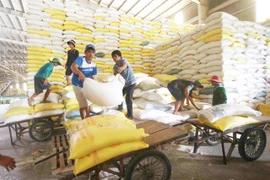 Workers load bags of rice at the Song Hau Food Company (Photo courtesy of the Vietnam Southern Food Corporation)
Workers load bags of rice at the Song Hau Food Company (Photo courtesy of the Vietnam Southern Food Corporation) TranThu Ha, Director of the AgResults Vietnam Emissions Reduction Pilot (AVERP)project, said in the five years since the project started it had helped morethan 23,000 farm households in Thai Binh adopt new practices and technologiesto increase yields and reduce CO2 emissions by two tonnes per hectare per crop.
“Theproject targets the dual benefit of socio-economic development andenvironmental protection.”
Itaims to reach 75,000 farm households in the province, reduce 375,000 tonnes ofCO2 emissions and save small farmers’ costs by 15 percent through lower inputuse.
Fourcompanies An Dinh, Thai Binh Seed, Fari-Seed, and Binh Dien Fertiliserparticipated in a pay-for-results prize competition to develop, test and scaleup technologies and tools to reduce GHG emissions.
“Ricefarmers reflected on the challenges they had experienced as early adopters ofthe farming technologies. They also said how they soon realised these agronomicpractices could reduce costs.”
Resultsin terms of increased yields and lower emissions are verified by US firmApplied Geo-Solutions and monitored by non-profit SNV Netherlands DevelopmentOrganisation and Thai Binh province’s Department of Agriculture and RuralDevelopment.
AVERP,implemented since 2016, has an 8 million-USD prize.
Ituses results-based incentives to encourage private competitors to deliverpackages and training to smallholder farmers.
Thesenew approaches help lower GHG emissions, protect the environment, andultimately reduce poverty among smallholder farmers in the province.
Fundedby the governments of the US, UK, Australia, and Canada and the Bill andMelinda Gates Foundation, the project focuses on reducing emissions during landpreparation and rice cultivation as most occur during these stages.
“Theresults of the project will play an important role in the orientation of theproject to restructure the rice production sector by 2025,” Ha said.
Theconference was co-organised by the Ministry of Agriculture and RuralDevelopment and SNV Netherlands Development Organisation./.




























